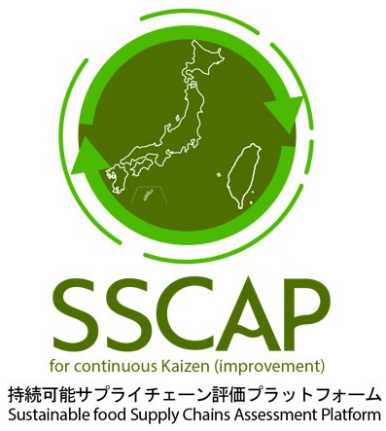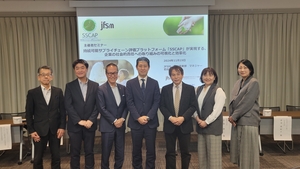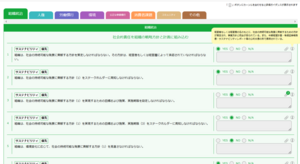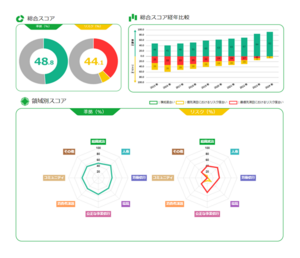WHAT’S NEW
[Press Release] SSCAP, a tool to visualise social responsibility initiatives, is released! Seminar and expert panel discussion held to celebrate its release.
The Japan Food Safety Management Association (JFSM) has launched the Sustainable Supply Chains Assessment Platform (SSCAP), a tool to visualise corporate social responsibility (CSR) and sustainable development initiatives and support the resolution of issues. Chains Assessment Platform), a tool to support the visualisation of CSR and sustainable development initiatives. While referring to the global standard ISO 26000, this self-assessment tool was created with the situation of Japanese companies in mind. It aims to lower the hurdles to initiatives on sustainable development in the entire supply chain, including the food industry, by identifying problems and issues without omissions with questions in all directions, and by consolidating the information in a dashboard so that the necessary information can be easily extracted at any time.

On the occasion of the tool's release, a commemorative event was held in a hybrid format on 19 November 2024. The event featured five experts involved in the development of the SSCAP, who discussed, through a panel discussion, 'On-the-ground challenges of addressing social responsibility and the changes that the SSCAP will bring'.
 Ichiro Abe from the Ministry of Agriculture, Forestry and Fisheries and panel discussion speakers.
Ichiro Abe from the Ministry of Agriculture, Forestry and Fisheries and panel discussion speakers.
[Event to celebrate the release of the tool].
To celebrate the release of the tool, an organisers' seminar and panel discussion was held on 19 November 2024. The event is archived on the JFSM YouTube channel and can be viewed at https://youtu.be/h2sLyJqBXss.
Mr Ichiro Abe, Director, Raw Material Procurement and Quality Control Improvement Office, Food Manufacturing Division, New Business and Food Industry Department, Ministry of Agriculture, Forestry and Fisheries (MAFF), opened the session by saying: 'With MAFF also preparing guidance on sustainable management in the food industry and a guide for food companies to respect human rights, the SSCAP is a timely initiative based on the needs of businesses in the food supply chain. We feel that the SSCAP is timely and in line with the needs of businesses involved in the food supply chain.' The SSCAP is timely in light of the needs of businesses involved in the food supply chain', said the guest of honour. The JFSM then gave an organisers' seminar on the background and objectives of the development of SSCAP and how to make corporate social responsibility visible. Finally, a panel discussion was held with five experts in CSR, environment, food safety, sustainability and human rights who were involved in the development of the SSCAP. The panel discussed the challenges to social responsibility that companies face, the changes that SSCAP can bring about and the prospects for visibility.
Speakers:
Makiko Akabane President, CSR Asia Ltd.
Mr. Keiichi Ujiie, Deputy Secretary General, Global Compact Network Japan
Shun Komatsu, Executive Officer, Japan Compliance & Governance Institute
Kazushi Sagawa Group Leader, Food Group, Crisis Management Consulting Department, SOMPO Risk Management Co.
Junichi Mizuo President, Japan Institute of Compliance & Governance, Professor Emeritus, Surugadai University
(Moderator) Naoko Wakaya, Manager, SSC Division, JFSM
Outline of SSCAP
SSCAP is a dashboard-style platform that enables companies to digitally visualise their CSR activities and monitor their progress and results in real time. The tool enables companies to not only measure and report on their social responsibility achievements, but also visualise their impact and build trust with their stakeholders.
For more information and to sign up for a free trial, please visit https://www.jfsm.or.jp/ssc/.
Key features include
Visualisation function for the status of initiatives:
The system can be used to identify problems and issues in all directions and accelerate the speed of initiatives.
The dashboard aggregates information so that the necessary information can be easily extracted at any time.
The system enables verification of the effectiveness of measures and future prospects by comparing the results over a period of up to 10 years.
Functions to facilitate the understanding of stakeholders:
The system promotes the growth of each individual's awareness by helping them to understand the background and reasons (eliminating the 'why').
The evaluation results are read and processed in a way that promotes a correct understanding of the company's current situation and aligns the vectors of the company as a whole.
By learning how to read evaluation results and learn procedures, you will gain a correct understanding of your company's current situation and align the vectors of the company as a whole.
Supplier management functions:
Reduce supplier management costs (costs, workload).
The system also helps to improve the response rate by making it easier to obtain understanding and cooperation from suppliers.
Real-time monitoring allows you to quickly nip risks in the bud.
Improve monitoring accuracy by identifying high-risk suppliers.
Improve the competitiveness of the entire supply chain by identifying common, priority issues.
input screen
Dashboard screen
For more information on the press release see:
https://prtimes.jp/main/html/rd/p/000000011.000088694.html
Disclaimer: The translation process used on this English website is partially offered by a "machine translation" for your convenience. This translated document is provided for information purposes only. In the event of a difference of interpretation or a dispute, the original Japanese version of this document is binding.


